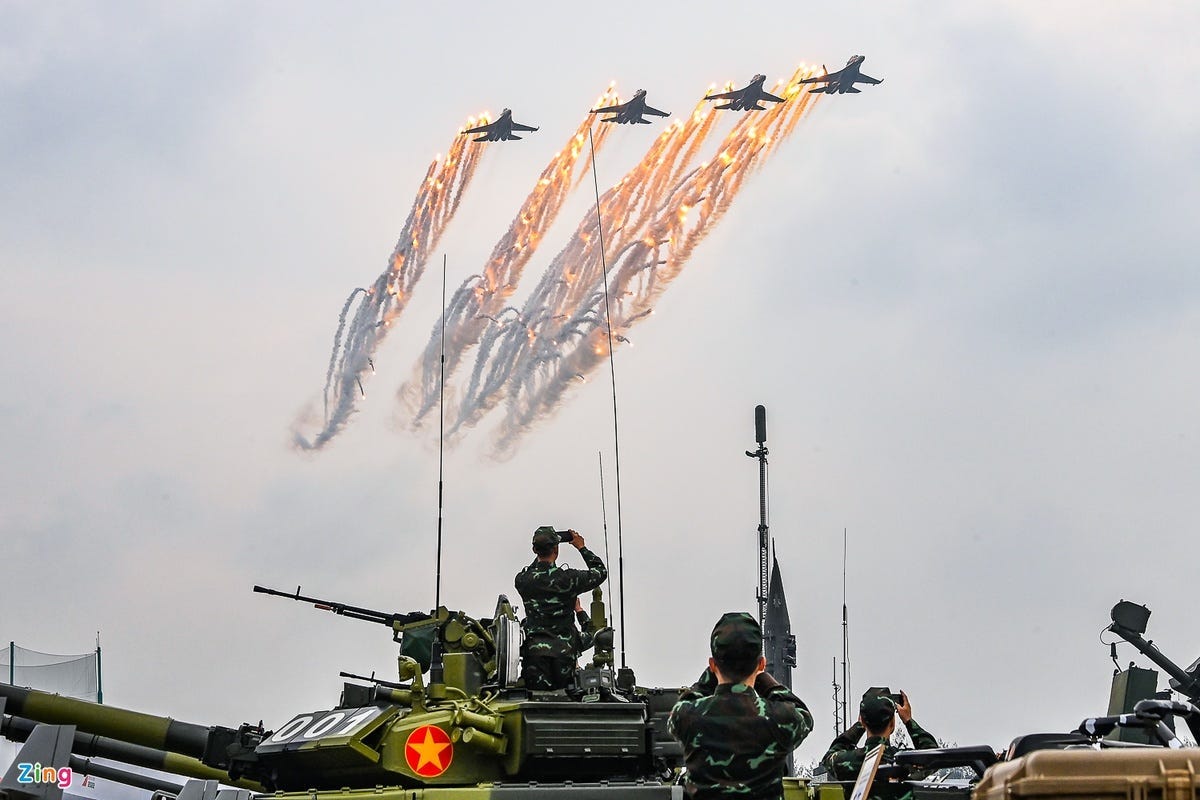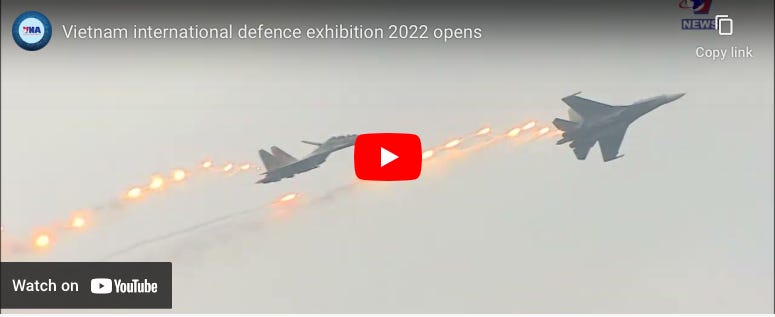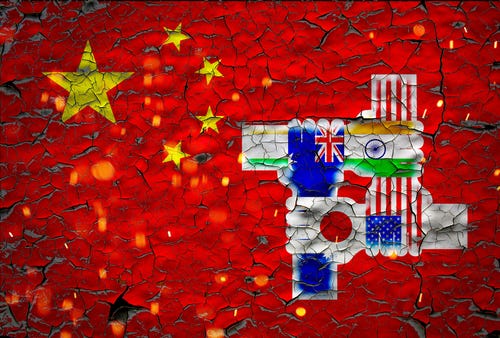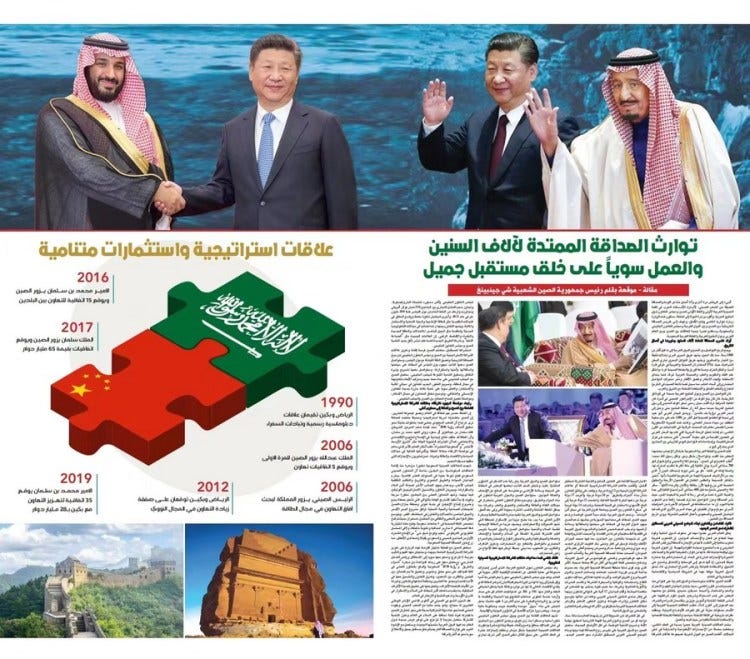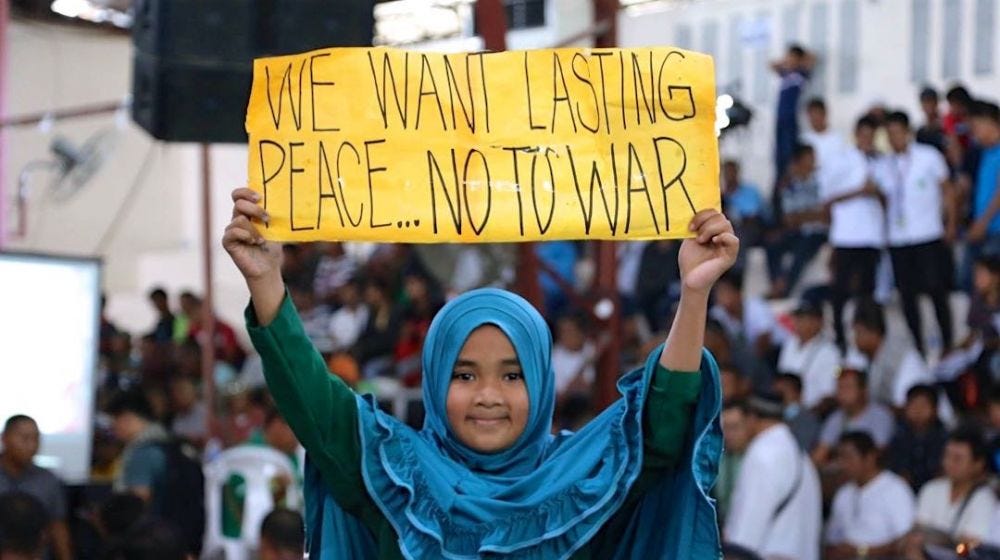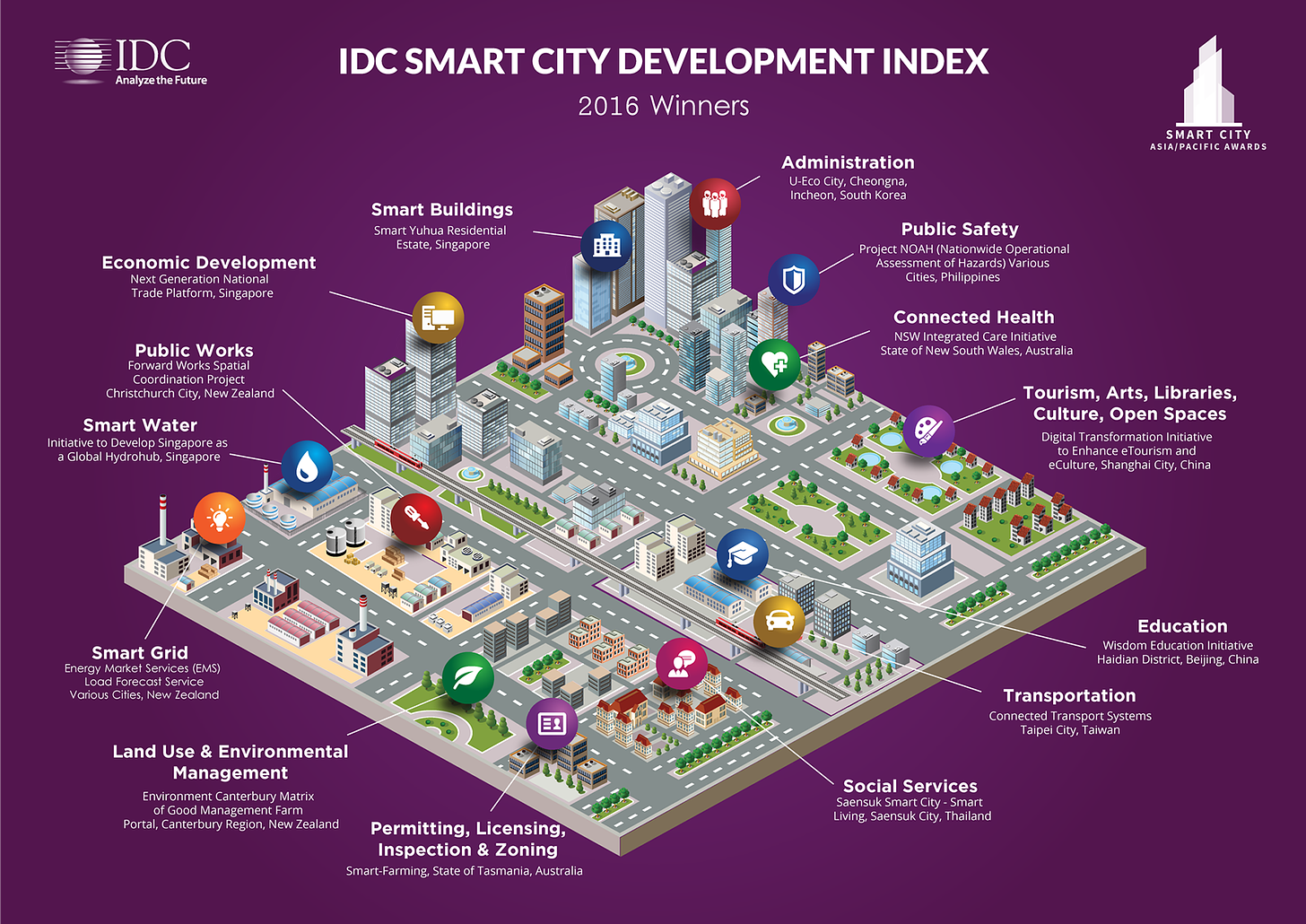A Rising Global South
From Asean to the Indo-Pacific and West Asia, it's all about guns, trade, energy, women and smart cities. But the 'pivot' is away from a declining US towards a rising Global South
UPDATE: In today’s Long Mekong Weekend Vietnam hold its first-ever international weapons fair with both Russia and China looking to increase sales. Meanwhile, the US and its allies are promoting a ‘no-access to US market’ Indo-Pacific Economic Framework (IPEF). Chinese President Xi Jinping outlines China’s approach for the China-Saudi Arabia State visit, GCC Summit, and 30 nation China-Arab Summit. And, ASEAN takes action on Women’s Security and over a hundred ASEAN mayor’s meet to advance Smart City development.
Enjoy your Long Mekong Weekend!
Vietnam international defence exhibition 2022 opens
The Vietnam International Defence Expo 2022 (Vietnam Defence 2022), the first of its kind, opened in Hanoi on December 8. Prime Minister Pham Minh Chinh attended and addressed the event.
Along with the growing trend of integration in all fields, international defence cooperation has been a focus of the Party and State of Vietnam to strengthen trust between Vietnam and other countries, stated PM at the event.
According to the host government leader, Vietnam Defence 2022 is a good chance for defence policymakers and defence industry firms to meet and seek partnership towards a world of peace, cooperation and prosperity.
On the occasion, Chinh also highlighted Vietnam’s defence policy, which is for peace, self-defence, and the people.
Following the opening ceremony, PM Chinh and delegates visited booths displaying defence industry products.
The Vietnam Defence 2022 covers an area of over 50,000sq.m, including more than 20,000sq.m of outdoor area. It attracts 174 enterprises from 30 countries.
A number of conferences will be held within the framework of the event./.
Watch the event here.
Read the full article here.
What is the Indo-Pacific Economic Framework, about to be negotiated in Brisbane?
Australia is about to play host to negotiators from 14 countries involved in the Indo-Pacific Economic Framework (IPEF) over six days in Brisbane from Saturday.
They include the United States, Australia, Brunei, Fiji, India, Indonesia, Japan, South Korea, Malaysia, New Zealand, the Philippines, Singapore, Thailand and Vietnam, but not China.
Singapore’s prime minister Lee Hsien Loong responded saying a further decoupling between the US and China could “result in less economic cooperation, less interdependency, less trust, and possibly, ultimately, a less stable world.”
Although as unfamiliar as many of the acronyms in the alphabet soup of trade deals to which Australia is a party, the IPEF has a very specific focus.
The US wants to use it to diversify its supply chains away from China towards its allies and create US-style rules in a region encompassing the Indian and Pacific Oceans and extending from the east of Africa to the west of the United States.
At the launch of negotiations in May the US said the agreement would enable the United States and our allies to decide on rules of the road that ensure American workers, small businesses, and ranchers can compete in the Indo-Pacific.
And the US is not involved in the two other big regional trade agreements involving IPEF members including Australia:
the Regional Comprehensive Economic Partnership (RCEP) of the ten ASEAN nations plus five others including China
the Comprehensive and Progressive Trans-Pacific Partnership (CPTPP) of 11 nations excluding China, from which the Trump administration withdrew in 2016.
There is still strong bipartisan US Congressional opposition to legally binding agreements like the CPTPP. This means in negotiating IPEF the US will not offer increased market access to Australia or other member countries.
The “four pillars” of the framework are
trade, in which there will be a general commitment to boost trade among members while recognising labour rights, environmental and other concerns
supply chains, aimed at diversifying away from China and facilitating cooperation among members in the event of major disruptions
clean economy, in which there will be recognition of the role of incentives in encouraging energy transitions
fair economy, in which the members commit to preventing and combating corruption and tax evasion.
India has opted out of the trade pillar but says it will sign up to the other pillars.
This means the IPEF will offer no immediate trade benefits for Australia or other countries, but for developing countries it will offer the prospect of US energy and other projects as an alternative to China’s One Belt One Road initiative.
Read the full article here.
Read the Whitehouse statement here.
A signed article by Chinese President Xi Jinping was published Thursday on the Saudi newspaper Al Riyadh, as he is attending the first China-Arab States Summit and the China-Gulf Cooperation Council Summit, and paying a state visit to Saudi Arabia in the Saudi capital Riyadh.
An English version of the article titled "Carrying Forward Our Millennia-old Friendship and Jointly Creating a Better Future" is as follows:
Carrying Forward Our Millennia-old Friendship and Jointly Creating a Better Future
Xi Jinping
President of the People's Republic of China
I am coming back to Riyadh, bringing with me profound friendship from the Chinese people. I am here to join my Arab friends for the first China-Arab States Summit and the first China-Gulf Cooperation Council (GCC) Summit and to pay a state visit to Saudi Arabia. Designed as a trip of building on the past and more importantly, of opening up a better future, the visit will carry forward our traditional friendship, and usher in a new era in China's relations with the Arab world, with Arab states of the Gulf, and with Saudi Arabia.
First, a time-honored friendship that goes back thousands of years
The exchanges between China and Arab states date back more than 2,000 years. The constant streams of caravans along the land Silk Road and the billowing sails along the maritime Spice Road have borne witness to how the Chinese and Arab civilizations interacted with and inspired each other across the Asian continent. It was through these exchanges that Chinese porcelain and paper-making and printing techniques were introduced to the West while Arab astronomy, calendar and medicine went all the way to the East. We have traded goods, sparked innovation, shared ideas, and spread the fruits of cultural exchanges to the rest of the world, leaving a splendid chapter in East-West engagement and mutual learning.
The contacts between China and Arab states of the Gulf are well documented. During the Eastern Han Dynasty, Gan Ying, a Chinese emissary, reached the "western seas," namely the Gulf, on his mission to the Roman Empire. This is the first official record of Chinese envoys reaching Arab states of the Gulf. More than 1,200 years ago, an Arab navigator, Abu Obeida, sailed from Sohar Port to the Chinese city of Guangzhou on a legendary journey that was later adapted to the exciting and well-known adventures of Sindbad. In the 1980s, a replica ship named the Sohar retraced the route opened by ancient Arab navigators, connecting the past and present friendly interactions between the two sides.
China and Saudi Arabia have admired each other and conducted friendly exchanges since ancient times. The prophet Muhammad said, "Seek knowledge even if you have to go as far as China." Seven hundred years ago, Wang Dayuan, a Chinese traveler of the Yuan Dynasty, arrived at Mecca which he described as a place with beautiful sceneries, mild weather, fertile rice fields, and a happy people in his book A Brief Account of Islands. It was an important book from which the Chinese learned about Saudi Arabia at that time. Six hundred years ago, Zheng He, a Chinese navigator of the Ming Dynasty, reached Jeddah and Medina on his oceangoing voyages, leaving behind him many stories of friendship and exchanges that are still widely told today. The joint Chinese-Saudi archaeological excavation of the ruins of the al Serrian port conducted in recent years has unearthed many porcelain wares of China's Song and Yuan dynasties. They stand as testaments to all those friendly interactions.
Second, solidarity and cooperation for a China-Arab community with a shared future in the new era
The Arab world is an important member of the developing world and a key force for upholding international fairness and justice. The Arab people value independence, oppose external interference, stand up to power politics and high-handedness, and always seek to make progress. Arab states are endowed with diverse resources, and have built industries with distinctive features, scored remarkable achievements in development, and demonstrated enormous potentials. The Arab civilization advocates the middle way and moderation, encourages inclusiveness and mutual learning, opposes clash of civilizations, and is deeply rooted in its rich culture and history. Be it on the world political, economic or cultural map, Arab states always claim an important place.
Since the 1950s, China has established diplomatic relations with all Arab states. Their interactions feature mutual understanding, mutual respect, mutual assistance and solidarity. They have become good friends treating each other as equals, good partners pursuing mutual benefit, and good brothers sharing weal and woe. In the 21st century, China-Arab relations have continued to move ahead against a fluid international landscape, and achieved historic leapfrog growth in political trust, mutually beneficial economic cooperation, and cultural mutual learning in both breadth and depth.
In the past decade, China-Arab relations entered a new era and registered a series of landmark and groundbreaking achievements in various areas. Collectively, China has established a future-oriented strategic partnership of comprehensive cooperation and common development with all Arab states. Individually, China has established comprehensive strategic partnership or strategic partnership with 12 Arab states, and signed documents on Belt and Road cooperation with 20 Arab states. Among Arab countries, 17 have expressed support for the Global Development Initiative (GDI), 15 have become members of the Asian Infrastructure Investment Bank, and 14 have participated in the China-League of Arab States Cooperation Initiative on Data Security.
Arab states firmly support the one-China principle and support China in safeguarding its core interests. Likewise, China supports Arab states in upholding sovereignty, independence, and territorial integrity. On issues such as the Palestinian question, China's firm support for Arab states has been consistent and unwavering. Major infrastructure projects jointly built by the two sides, including the Djamaa El Djazair mosque of Algeria, the Lusail Stadium of Qatar, the new headquarters of the Central Bank of Kuwait, as well as the Merowe Dam, the Roseires Dam heightening, and the Upper Atbara Dams Complex Project of Sudan, have become landmarks of China-Arab friendship. China has set up 20 Confucius institutes and two Confucius classrooms in Arab states. And over 40 Chinese universities teach Arabic as a major, contributing inexhaustible energy for growing China-Arab friendship.
Since the outbreak of COVID-19, China and Arab states have come to each other's aid and navigated through the difficulties together. The two sides have carried out efficient cooperation in such areas as vaccine research and application, joint epidemic prevention and control, experience sharing, medical services and pharmaceuticals, setting a fine example of solidarity in fighting the virus. Under the framework of China-Arab States Cooperation Forum, 17 cooperation mechanisms have been launched to expand and substantiate the cooperation agenda, giving a strong boost to China-Arab relations and providing a paradigm for the solidarity and cooperation among developing countries.
The world is now undergoing momentous changes unseen in a century. Both China and Arab states face the historic mission of realizing national rejuvenation and speeding up national development. In this new context, China will work with Arab states to carry forward the traditional friendship and jointly build a China-Arab community with a shared future in the new era. China and Arab states will continue to hold high the banner of non-interference in internal affairs, firmly support each other in safeguarding sovereignty and territorial integrity, and jointly uphold international fairness and justice. We will continue to enhance together Belt and Road cooperation, keep expanding practical cooperation in such areas as food, energy, investment, financing and medical services, and pursue mutually beneficial cooperation with higher quality and in greater depth. We will continue to jointly act on the GDI and the Global Security Initiative so as to stabilize volatile regions and contribute more positive energy to peace and development. We will continue to jointly advocate peace, development, equity, justice, democracy and freedom -- the common values of humanity, strive to replace estrangement and clash of civilizations with exchanges and mutual learning, promote understanding and affinity between our peoples, and build "a garden of civilizations" featuring mutual appreciation and inspiration.
Third, joint endeavor to cultivate the China-GCC strategic partnership
The GCC has achieved remarkable progress in its integration process, which makes it one of the world's most dynamic regional organizations. Given their geographical locations, GCC countries serve as a hub linking Asia, Africa and Europe. Endowed with rich energy resources, including 30 percent of the oil reserve and 20 percent of the natural gas reserve of the world, GCC countries are an energy tank for world economy. With their pioneering and enterprising spirit, GCC countries provide a fertile ground for high-tech industries. Over the past four decades and more, the GCC has been working hard to build an integral market, an integral economy, and an integral financial system in the region, and has been playing an increasingly important role in regional and international affairs.
Over the years, China and GCC countries have maintained healthy and steady growth in bilateral relations, and carried out wide-ranging, in-depth cooperation with tangible outcomes in all areas. In the past 10 years in particular, China-GCC relations have grown from strength to strength and yielded fruitful results. China has remained the GCC's largest trading partner and largest export market of petrochemical products. In 2021, two-way trade exceeded 230 billion U.S. dollars, and China's import of crude oil from GCC countries topped 200 million tons. The two sides enjoy extensive, in-depth cooperation in traditional areas such as production capacity, infrastructure development, investment and finance. Cooperation in high-tech sectors including 5G communications, new energy, space and digital economy is also gaining momentum. The new signature project of smart manufacturing cooperation and the new landscape of industrial cooperation have added fresh impetus to the development of China and GCC countries.
Looking into the future, China will seize the opportunity of the establishment and consolidation of the China-GCC strategic partnership to cement their traditional friendship and deepen mutual trust. China will continue to firmly support GCC countries in upholding sovereignty, independence, security and stability, and continue to support the GCC in accelerating integration and pursuing diversified development. China will work with the GCC to foster a new pattern of multi-faceted energy cooperation, accelerate new development in financial and investment cooperation, cultivate new highlights in people-to-people exchanges, and explore new areas of innovation cooperation. All this will help increase the convergence of interests between China and GCC countries.
Fourth, sustained efforts to bring the China-Saudi Arabia comprehensive strategic partnership to new heights
Saudi Arabia is a major energy exporter in the world and a member of the G20. As its strategic partner and true friend, China is heartened to see that under the leadership of King Salman and Crown Prince Mohammed bin Salman, the Saudi people are marching in big strides toward Vision 2030 and making important progress in economic and social reform and diversification. Saudi Arabia's major development initiatives, the Middle East Green Initiative and the Saudi Green Initiative among many others, have captured wide attention. Its stature and influence in global political, economic and energy domains are on the rise. We are proud of our good friend for these accomplishments.
Since the establishment of diplomatic ties, relations between China and Saudi Arabia have maintained robust growth. Most notably, China-Saudi Arabia cooperation has made major headway in the past 10 years. The two sides respect each other's sovereignty and development path, respect each other's history and cultural traditions, support each other in defending national security and stability, and undertake close strategic coordination. Practical cooperation is expanding rapidly. Major projects have been launched one after another, including the Yanbu Aramco Sinopec Refining Company, the Sino-Saudi Gulei Ethylene Complex Project, the Chinese industrial cluster in Jazan Economic City, the Red Sea utilities and infrastructure project, 5G communications, and joint lunar explorations. People-to-people exchanges continue to grow. Chinese language major is now available in four Saudi universities, and optional Chinese language courses are provided in eight middle and primary schools. Hakim &Kong Xiaoxi, the first animated co-production of China and Saudi Arabia, is popular among children, sowing the seed of China-Saudi Arabia friendship in their hearts.
China will take this visit as an opportunity to strengthen its comprehensive strategic partnership with Saudi Arabia. We will continue to give each other understanding and support, and jointly advocate independence and oppose external interference. We will further synergize China's Belt and Road Initiative and Saudi Arabia's Vision 2030, deepen and substantiate practical cooperation in all areas, and increase the convergence of interests and people-to-people connectivity between the two countries. We will strengthen collaboration under multilateral frameworks such as the UN, the G20 and the Shanghai Cooperation Organization, jointly practice true multilateralism, and make greater contribution to maintaining peace and stability in the Middle East and promoting development and prosperity of the world.
Last October, the Communist Party of China successfully convened its 20th National Congress, and it is now rallying and leading the Chinese people toward the goal of building a modern socialist country in all respects. As a staunch force for world peace and common development, China will stay committed to providing new opportunities for Arab states and all other countries in the world through its own development, and work with our Arab brothers to carry forward the traditional friendship and create a better future together.
This English version was published in Peoples Daily.
ASEAN launches plan to promote women's security in Southeast Asia
The Association of Southeast Asian Nations (ASEAN) launched a regional plan of action on women's peace and security on Monday in partnership with UN Women, said a joint statement.
The ASEAN Regional Plan of Action on Women, Peace and Security (ASEAN RPA on WPS) was adopted by the ASEAN leaders during the 40th and 41st ASEAN summits in Phnom Penh last month as a key deliverable during the ASEAN chairmanship of Cambodia, the statement said.
It aims to advance commitments to the women's peace and security agenda and turn them into action, it said.
Cambodian Minister of Women's Affairs Ing Kantha Phavi said the development of the ASEAN RPA on WPS is a major step forward to fulfill ASEAN's vision in achieving gender equality.
"Promoting women's roles and participation across all realms of peace and security ranging from conflict prevention, peace building, preventing violent extremism and tackling emerging security risks such as disaster and pandemics in the region is imperative to reach our goal as inclusive and people-centered community," she said.
"ASEAN is committed to continuing to forge ahead with advancing WPS agenda and the ASEAN RPA on WPS will guide our ways," she added.
The regional plan of action is a major step forward in ASEAN's efforts to ensure that its 10 member states recognize and leverage women's participation and leadership in preventing conflict and in maintaining peace in the region.
UN Women in Asia and the Pacific regional director Sarah Knibbs said the women, peace and security agenda was founded with a simple but transformative idea that peace was fundamentally linked to equality between women and men.
"The ASEAN Regional Plan of Action on WPS provides a critical framework for realizing a more inclusive and sustainable peace in this region and a starting point to mainstream WPS into peace and security decision-making in the region," she said.
The launch event called for ASEAN member states to commit themselves to effectively implementing the ASEAN RPA on WPS, the statement said.
Founded in 1967, ASEAN groups Brunei, Cambodia, Indonesia, Laos, Malaysia, Myanmar, the Philippines, Singapore, Thailand and Vietnam.
Read full article here.
ASEAN mayors gather in Cambodia to promote cooperation for smart cities
The mayors of capital cities of the Association of Southeast Asian Nations (ASEAN) gathered here on Friday to discuss ways to promote comprehensive cooperation for building smart, resilient, and sustainable cities in the region.
Addressing the opening ceremony of the ASEAN Mayors Forum and the Meeting of Governors/Mayors of ASEAN Capitals 2022, Cambodian Prime Minister Samdech Techo Hun Sen said cities are the hearts of countries and regions, and they are places for all kinds of activities, particularly in the socio-economic, cultural and political fields.
"In this sense, the socio-economic development and the building of a strong, sustainable and inclusive community must begin with the building and connecting of smart, resilient and sustainable cities," he said.
Established in 2018, the ASEAN Smart Cities Network has been making significant contributions to realizing the ASEAN Community Vision 2025, the Master Plan on ASEAN Connectivity 2025, the UN 2030 Agenda for Sustainable Development, and the New Urban Agenda, he said.
Hun Sen said that in the context that ASEAN and the world have been facing a series of challenges, building smart and green cities with the use of digital technology is the most accurate direction for the present and future.
"Smart cities have great potentials in addressing common issues of urban planning in an innovative way, strengthening resilience to various risks, and especially improving the well-being and prosperity of the livelihoods of local people in a new normal," he said.
"Furthermore, smart cities will become major poles for promoting stronger socio-economic, business, trade and investment activities, as well as providing job and business opportunities to the general population in countries and the entire ASEAN region," he added.
The Cambodian leader said that ensuring peace, security, stability and prosperity is the main and most important foundation for building smart, resilient and sustainable cities.
He said all ASEAN city and capital administrations should work together to accelerate and expand the potentials of the ASEAN smart city connectivity and integration, by jointly promoting digitalization and digital transformation.
Meanwhile, Hun Sen asked ASEAN local governments to support the Cambodia-proposed ASEAN Green Deal, which aims to contribute to the building of greener ASEAN smart cities with a more efficient use of resources.
ASEAN groups Brunei, Cambodia, Indonesia, Laos, Malaysia, Myanmar, the Philippines, Singapore, Thailand and Vietnam.
Read full article here.




